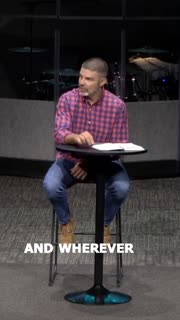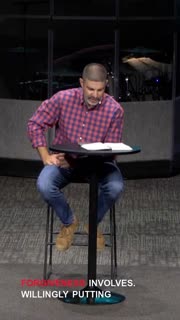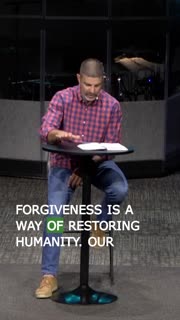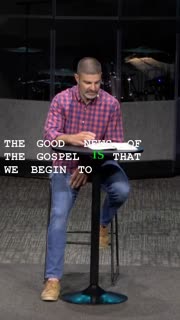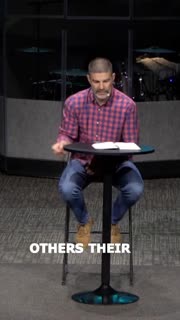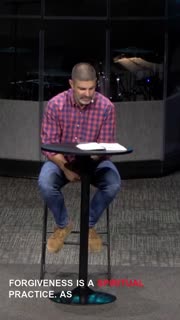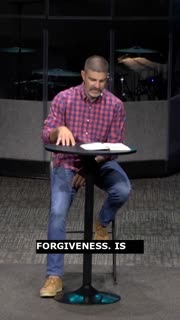Forgiveness: A Daily Journey of Transformation
Summary
### Summary
Today, we delved into the profound and often challenging topic of forgiveness, as taught by Jesus in the Lord's Prayer. We began by acknowledging the harsh realities of life and the pressures that often follow us from Sunday into the week. The good news of the gospel is that our struggles are not the end; they are the beginning of a deeper journey with Christ. We explored Paul's words about the treasure we hold in jars of clay, emphasizing that our momentary afflictions are producing an eternal weight of glory.
We then turned to Jesus' teaching on prayer, specifically focusing on the Lord's Prayer. Jesus' inclusion of forgiveness in this prayer is not incidental but foundational. Forgiveness is not just a one-time act but an ongoing experience that is crucial for our spiritual transformation. We need forgiveness daily, just as we need our daily bread. This daily need for forgiveness underscores the reality that as long as sinners live with sinners, forgiveness will always be necessary.
We discussed why forgiveness is so difficult, noting that it taps into deep-seated pain and trauma. Forgiveness involves a voluntary transformation of our feelings, attitudes, and behaviors, moving us from resentment to compassion. This transformation is not just about us and the person who wronged us; it is an act of worship to God. Jesus' parable of the two debtors illustrates that those who are forgiven much, love much.
Forgiveness is also a spiritual practice that shapes us into the image of Christ. It is essential for our relationships and communities. Practicing forgiveness means participating with God in the healing of the world. Jesus' words on the cross, "Forgive them, for they know not what they do," exemplify the depth of forgiveness we are called to extend.
Finally, we discussed practical steps for practicing forgiveness: starting with those closest to us, acknowledging the impact and pain, and changing our expectations to align with the continual need for forgiveness. Forgiveness is a continual pursuit of personal and relational healing, essential for living in the upside-down kingdom of God.
### Key Takeaways
1. Forgiveness as Daily Bread: Just as we need food daily, we need to be reminded of our need for forgiveness and the necessity to forgive others every day. This daily practice of forgiveness is foundational to our spiritual transformation and growth in Christ. [44:53]
2. Forgiveness and Pain: Forgiveness taps into deep-seated pain and trauma. It involves willingly putting aside feelings of resentment and transforming our attitudes and behaviors. This process is not about dismissing the pain but acknowledging it and choosing to move beyond it. [49:00]
3. Forgiveness as Worship: Forgiveness is an act of worship to God. It acknowledges the immense forgiveness we have received from Him and extends that grace to others. This act of worship deepens our relationship with God and reflects His love and mercy. [57:11]
4. Forgiveness as Spiritual Practice: Forgiveness is a spiritual practice that shapes us into the image of Christ. It is essential for our relationships and communities, fostering an environment of grace and mercy. Practicing forgiveness means participating with God in the healing of the world. [01:02:13]
5. Practical Steps for Forgiveness: Start with those closest to you, acknowledge the impact and pain, and change your expectations to align with the continual need for forgiveness. This approach helps in building a forgiving community and reflects the ongoing nature of forgiveness in our lives. [01:06:49]
### YouTube Chapters
[0:00] - Welcome
[28:50] - The Reality of Life's Struggles
[31:08] - The Good News of the Gospel
[32:23] - Confidence in God's Presence
[33:39] - The Lord's Prayer and Forgiveness
[34:51] - Jesus' Teaching on Prayer
[35:42] - The Blessed Life in God
[36:31] - The Fulfillment of Jesus' Mission
[37:19] - The Challenge of Jesus' Teachings
[38:04] - The Necessity of Forgiveness
[39:19] - Defining Forgiveness
[41:08] - The Depth of Forgiveness
[43:21] - Forgiveness as Spiritual Transformation
[44:53] - Daily Need for Forgiveness
[46:09] - The Difficulty of Practicing Forgiveness
[48:24] - The Reality of Pain and Trauma
[50:35] - The Necessity of Forgiveness in Community
[52:28] - Forgiveness and Relationship with God
[54:52] - The Relational Aspect of Sin
[57:11] - Forgiveness as Worship
[01:00:44] - Jesus' Parable of the Two Debtors
[01:02:13] - Forgiveness as Spiritual Practice
[01:03:34] - Participating in God's Healing Work
[01:06:49] - Practical Steps for Forgiveness
[01:10:16] - Changing Expectations and Experience
[01:12:40] - Living in the Upside-Down Kingdom of God
Study Guide
### Bible Study Discussion Guide: The Power of Forgiveness
#### Bible Reading
1. Matthew 6:9-15 (The Lord's Prayer)
> "Pray then like this: Our Father in heaven, hallowed be your name. Your kingdom come, your will be done, on earth as it is in heaven. Give us this day our daily bread, and forgive us our debts, as we also have forgiven our debtors. And lead us not into temptation, but deliver us from evil. For if you forgive others their trespasses, your heavenly Father will also forgive you, but if you do not forgive others their trespasses, neither will your Father forgive your trespasses."
2. 2 Corinthians 4:7-18 (Treasure in Jars of Clay)
> "But we have this treasure in jars of clay, to show that the surpassing power belongs to God and not to us. We are afflicted in every way, but not crushed; perplexed, but not driven to despair; persecuted, but not forsaken; struck down, but not destroyed; always carrying in the body the death of Jesus, so that the life of Jesus may also be manifested in our bodies. For we who live are always being given over to death for Jesus' sake, so that the life of Jesus also may be manifested in our mortal flesh. So death is at work in us, but life in you. Since we have the same spirit of faith according to what has been written, 'I believed, and so I spoke,' we also believe, and so we also speak, knowing that he who raised the Lord Jesus will raise us also with Jesus and bring us with you into his presence. For it is all for your sake, so that as grace extends to more and more people it may increase thanksgiving, to the glory of God. So we do not lose heart. Though our outer self is wasting away, our inner self is being renewed day by day. For this light momentary affliction is preparing for us an eternal weight of glory beyond all comparison, as we look not to the things that are seen but to the things that are unseen. For the things that are seen are transient, but the things that are unseen are eternal."
#### Observation Questions
1. What does Jesus teach us to pray for in Matthew 6:9-15, and how does forgiveness fit into this prayer?
2. According to 2 Corinthians 4:7-18, what are the "jars of clay" and what do they signify about our struggles and God's power?
3. In the sermon, what analogy is made between our daily need for food and our need for forgiveness? ([44:53])
4. How does the sermon describe the relationship between forgiveness and worship? ([57:11])
#### Interpretation Questions
1. Why does Jesus emphasize the need for daily forgiveness in the Lord's Prayer? How does this reflect our daily spiritual needs? ([44:53])
2. How does the concept of "treasure in jars of clay" from 2 Corinthians 4:7-18 relate to the idea of forgiveness and our human frailty?
3. The sermon mentions that forgiveness is an act of worship. How does forgiving others deepen our relationship with God? ([57:11])
4. What does the sermon suggest about the difficulty of practicing forgiveness and its connection to deep-seated pain and trauma? ([49:00])
#### Application Questions
1. Reflect on your daily life. How can you incorporate the practice of seeking and offering forgiveness as part of your daily routine, similar to how you seek daily bread? ([44:53])
2. Think of a recent situation where you found it difficult to forgive someone. What steps can you take to move from resentment to compassion in that situation? ([49:00])
3. How can you view forgiveness as an act of worship in your personal life? What changes might this perspective bring to your relationships? ([57:11])
4. Identify a person close to you with whom you have unresolved issues. What practical steps can you take to start the process of forgiveness with them? ([01:06:49])
5. How can acknowledging the impact and pain of a hurtful situation help you in the process of forgiveness? Share a personal experience if you feel comfortable. ([49:00])
6. The sermon suggests that forgiveness is essential for living in the upside-down kingdom of God. How can you practice forgiveness in your community to foster an environment of grace and mercy? ([01:02:13])
7. Jesus' words on the cross, "Forgive them, for they know not what they do," exemplify the depth of forgiveness. How can you apply this level of forgiveness in your own life, especially towards those who may not seek it? ([01:04:14])
Devotional
Day 1: Forgiveness as Daily Bread
Forgiveness is as essential to our spiritual well-being as daily bread is to our physical sustenance. Just as we need food every day to nourish our bodies, we need to be reminded of our need for forgiveness and the necessity to forgive others daily. This daily practice of forgiveness is foundational to our spiritual transformation and growth in Christ. It underscores the reality that as long as we live in a world filled with imperfect people, forgiveness will always be necessary. This continual need for forgiveness helps us to remain humble and dependent on God's grace, fostering a deeper relationship with Him.
Jesus' inclusion of forgiveness in the Lord's Prayer is not incidental but foundational. It is a daily reminder that we are in constant need of God's mercy and that we are called to extend that same mercy to others. This daily practice of forgiveness transforms our hearts and minds, aligning us more closely with the character of Christ. It is through this ongoing experience of giving and receiving forgiveness that we are spiritually transformed and grow in our faith.
Matthew 6:11-12 (ESV): "Give us this day our daily bread, and forgive us our debts, as we also have forgiven our debtors."
Reflection: Think of a recent situation where you felt wronged. How can you practice daily forgiveness in this situation, and what steps can you take today to begin this process? [44:53]
Day 2: Forgiveness and Pain
Forgiveness taps into deep-seated pain and trauma, making it a challenging but necessary act. It involves willingly putting aside feelings of resentment and transforming our attitudes and behaviors. This process is not about dismissing the pain but acknowledging it and choosing to move beyond it. Forgiveness requires us to confront our hurt and pain head-on, allowing God to heal those wounds. It is through this process that we experience true freedom and peace.
Forgiveness is difficult because it often involves deep emotional wounds and trauma. It requires a voluntary transformation of our feelings, attitudes, and behaviors, moving us from resentment to compassion. This transformation is not just about us and the person who wronged us; it is an act of worship to God. By choosing to forgive, we are participating in God's healing work in our lives and the lives of others. It is a powerful testimony of God's grace and mercy at work within us.
Ephesians 4:31-32 (ESV): "Let all bitterness and wrath and anger and clamor and slander be put away from you, along with all malice. Be kind to one another, tenderhearted, forgiving one another, as God in Christ forgave you."
Reflection: Reflect on a painful experience in your life. How can you acknowledge this pain and begin the process of forgiveness today? What steps can you take to move from resentment to compassion? [49:00]
Day 3: Forgiveness as Worship
Forgiveness is an act of worship to God. It acknowledges the immense forgiveness we have received from Him and extends that grace to others. This act of worship deepens our relationship with God and reflects His love and mercy. When we forgive, we are not only obeying God's command but also expressing our gratitude for the forgiveness we have received. It is a way of honoring God and demonstrating His character to the world.
Forgiveness is a profound act of worship that goes beyond our personal relationships. It is a recognition of the grace and mercy we have received from God and a commitment to extend that same grace to others. By forgiving, we are participating in God's redemptive work and reflecting His love and mercy to those around us. This act of worship deepens our relationship with God and transforms our hearts, making us more like Christ.
Colossians 3:13 (ESV): "Bearing with one another and, if one has a complaint against another, forgiving each other; as the Lord has forgiven you, so you also must forgive."
Reflection: Think of someone you need to forgive. How can you view this act of forgiveness as an act of worship to God? What steps can you take today to extend grace and mercy to this person? [57:11]
Day 4: Forgiveness as Spiritual Practice
Forgiveness is a spiritual practice that shapes us into the image of Christ. It is essential for our relationships and communities, fostering an environment of grace and mercy. Practicing forgiveness means participating with God in the healing of the world. It is through this practice that we become more like Christ and reflect His love to those around us. Forgiveness is not just a one-time act but an ongoing experience that is crucial for our spiritual transformation.
Forgiveness is a spiritual discipline that requires intentionality and practice. It is through this discipline that we are shaped into the image of Christ and become agents of His healing work in the world. Forgiveness is essential for healthy relationships and communities, as it fosters an environment of grace and mercy. By practicing forgiveness, we are participating with God in the healing of the world and reflecting His love and compassion to those around us.
Luke 6:37 (ESV): "Judge not, and you will not be judged; condemn not, and you will not be condemned; forgive, and you will be forgiven."
Reflection: How can you incorporate the practice of forgiveness into your daily spiritual disciplines? What steps can you take to foster an environment of grace and mercy in your relationships and community? [01:02:13]
Day 5: Practical Steps for Forgiveness
Start with those closest to you, acknowledge the impact and pain, and change your expectations to align with the continual need for forgiveness. This approach helps in building a forgiving community and reflects the ongoing nature of forgiveness in our lives. Forgiveness is a continual pursuit of personal and relational healing, essential for living in the upside-down kingdom of God. By taking practical steps towards forgiveness, we can create a culture of grace and mercy in our communities.
Forgiveness begins with those closest to us, as these relationships often have the most significant impact on our lives. Acknowledging the pain and impact of the hurt is the first step towards healing. Changing our expectations to align with the continual need for forgiveness helps us to remain humble and dependent on God's grace. By taking these practical steps, we can build a forgiving community that reflects the ongoing nature of forgiveness in our lives and the upside-down kingdom of God.
Matthew 18:21-22 (ESV): "Then Peter came up and said to him, 'Lord, how often will my brother sin against me, and I forgive him? As many as seven times?' Jesus said to him, 'I do not say to you seven times, but seventy-seven times.'"
Reflection: Think of a close relationship where forgiveness is needed. How can you acknowledge the impact and pain in this relationship and take practical steps towards forgiveness today? What changes in your expectations are necessary to align with the continual need for forgiveness? [01:06:49]
Quotes
### Quotes for Outreach
1. "Whoever you are and wherever you are, whatever you're facing, I want you to be confident that God has not abandoned you. He's not forgotten you. He's not grown weary of you. He, more than ever, is always near to the brokenhearted, the crushed, the afflicted. That he isn't saying, try harder, do more, be better, but rather saying, come to me, abide in me, rest with me." [32:23] (20 seconds)
2. "Forgiveness involves willingly putting aside feelings of resentment towards someone who has committed a wrong, been unfair or hurtful, or otherwise harmed you in some way. Forgiveness is not merely accepting what happened or ceasing to be angry. Rather it involves a voluntary transformation of your feelings, attitudes and behavior so that you are no longer dominated by resentment and can express compassion, generosity, or the like towards the person who wronged you." [41:40] (32 seconds)
3. "Forgiveness is not an event or an act. It's an ongoing experience as we grow in Christ. In other words, forgiveness is at the foundation of our spiritual transformation. We need it every day." [43:21] (12 seconds)
4. "Forgiveness is not revenge. But it is that removal of shame, that removal of guilt, that people might actually be able to experience the grace and mercy of God." [01:03:34] (12 seconds)
5. "Forgiveness is a way of restoring humanity. Our own and others. You may have done that in the moment, but I don't believe that's who you have to be in this life." [01:06:13] (10 seconds)
### Quotes for Members
1. "The good news of the gospel is that we begin to see that the war is just beginning. That we become aware that the life that we've always lived, we don't have to live. That it's not all that there is. That a day is coming, one day, where we will press into who we are and who we're becoming in Christ. That we're going to know who he is at a greater and greater level in this world." [31:08] (23 seconds)
2. "Forgiveness is about how we experience, know and enjoy the father. Notice he said this, if you forgive others their trespasses, your heavenly father will also forgive you. But if you do not forgive others their trespasses, neither will your father forgive your trespasses." [52:28] (-1008 seconds)
3. "Forgiveness is a spiritual practice. As we are being formed in the image of Christ. We define spiritual formation. Or discipleship here. Disciples are those who have confessed with their mouth and believed in their heart that Jesus is their savior. Discipleship is learning to live as if Jesus is our savior. It is learning to live as if the kingdom of God is real." [01:01:33] (25 seconds)
4. "Forgiveness is an act of worship to God. When you forgive someone, it is not just about you and them. That's actually secondary. It's first and foremost about you and God." [01:03:34] (19 seconds)
5. "Forgiveness is acknowledging what someone has done. It's who they were. But it's also declaring in hope and believing that they can become who God created them to be. Forgiveness is not refusing to let sin, the past or shame have the final word." [01:06:13] (18 seconds)
